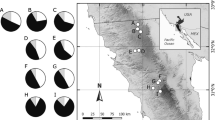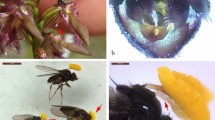Summary
The yucca-yucca moth interaction is a classic case of obligate mutualism. Female moths pollinate and oviposit in the gynoecium of the flower; however, maturing larvae eat a fraction of the developing seeds. We studied within-fruit distributions of four seed types (fertile, infertile, eaten and uneaten seeds) in order to evaluate costs and benefits in aYucca schottii population in southeastern Arizona. We focused on how the spatial arrangement of seeds affected larval behaviour and, hence, the costs of the mutualism to the yucca. Infertile seeds were distributed throughout both infested and uninfested locules. Additionally, moth larvae feeding in a single locule preferred fertile seeds and even avoided infertile seeds and left the fruit significantly more often when they encountered infertile seeds. We suggest that, regardless of the cause of infertile seeds, they function as blocking units within seed locules and therefore reduce seed predation by moth larvae. We also suggest that, together with certain other fruit traits, the presence of infertile seeds promotes the evolutionary stability of this pollination mutualism.
Similar content being viewed by others
References
Addicott, J.F. (1981) Stability properties of 2-species models of mutualism: simulation studies.Oecologia 49 42–9.
Addicott, J.F. (1984) Mutualistic interactions in population and community ecology. InA new ecology: novel approaches to interactive systems (P.W. Price, C.N. Slobodchikoff and B.S. Gaud, eds) pp. 437–55. John Wiley & Sons, New York.
Addicott, J.F. (1986a) On the population consequences of mutualism. InCommunity ecology (J.M. Diamond and T.J. Case, eds) pp. 425–36. Harper and Row, New York.
Addicott, J.F. (1986b) Variation in the costs and benefits of mutualism: the interaction between yuccas and yucca moths.Oecologia 70 486–94.
Aker, C.L. (1982) Regulation of flower, fruit and seed production by monocarpic perennial,Yucca whipplei.J. Ecol. 70 357–72.
Aker, C. and Udovic, D. (1981) Oviposition and pollination behavior of the yucca mothTegeticula maculata (Lepidoptera: Prodoxidae), and its relation to the reproductive biology ofYucca whipplei (Agavaceae).Oecologia 49 96–101.
Baker, H.G. (1986) Yuccas and yucca moths — a historical commentary.Ann. Missouri Bot. Gard. 73 556–64.
Boucher, D.H., James, S. and Keeler, K.H. (1982) The ecology of mutualism.Annu. Rev. of Ecol. and System. 13 315–47.
Bronstein, J.L. (1994) Our current understanding of mutualism.Q. Rev. Biol. 69 31–51.
Daniel, W.W. (1983)Biostatistics: A Foundation for Analysis in the Health Sciences. John Wiley & Sons, New York.
Dodd, R.J. and Linhart, Y.B. (1994) Reproductive consequences of interactions betweenYucca glauca (Agavaceae) andTegeticula yuccasella (Lepidoptera) in Colorado.Am. J. Bot. 81 815–25.
Engelmann, G. (1872) The flower of yucca and its fertilization.Bull. Torrey Bot. Club 3 33.
James, C.D., Hoffman, M.T., Lightfoot, D.C., Forbes, G.S. and Whitford, W.G. (1994) Fruit abortion inYucca elata and its implications for the mutualistic association with yucca moths.Oikos 69 207–16.
Janzen, D.H. (1985) The natural history of mutualism. InThe biology of mutualism (D.H. Boucher, ed.) pp. 40–99. Croom Helm, London.
Johnson, R. (1988) The reproductive cost to the yucca plant (Yucca filamentosa L.) in its mutualistic relationship with the yucca moth (Tegeticula yuccasella Riley).J. Tennessee Acad. Sci. 63 77–8.
Keeley, J.E. and Ikeda, D.A. (1986) Seed predation by yucca moths on semelparous, iteroparous and vegetatively reproducing subspecies ofYucca whipplei (Agavaceae).Am. Midl. Nat. 115 1–9.
Keeley, J.E., Keeley, S.C., Swift, C.C. and Lee, J. (1984) Seed predation due to the yucca-moth symbiosis.Ame. Midl. Nat. 112 187–91.
May, R.M. (1981)Theoretical Ecology: Principles and Applications. Blackwell Scientific Publications, Oxford.
Pellmyr, O. and Huth, C.H. (1994) Evolutionary stability of mutualism between yuccas and yucca moths.Nature 372 257–60.
Powell, J.A. (1984) Biological interrelationships of moths andYucca schottii.Univ. Calif. Publ. Entomol. 100 1–99.
Powell, J.A. (1992) Interrelationships of yuccas and yucca moths.Trends Ecol. Evol. 7 10–15.
Riley, C.V. (1872) The fertilization of the yucca plant byPronuba yuccasella.Can. Entomol. 4 182.
Riley, C.V. (1892) The yucca moth and the yucca pollination.Missouri Bot. Gard. Rep. 3 99–159.
Tyre, A.J. and Addicott, J.F. (1993) Facultative non-mutualistic behavior by an ‘obligate’ mutualist: ‘cheating’ by yucca moths.Oecologia 94 173–5.
Udovic, D. (1981) Determinants of fruit set inYucca whipplei: reproductive expenditure vs. pollinator availabilty.Oecologia 48 389–99.
Udovic, D. and Aker, C. (1981) Fruit abortion and the regulation of fruit number inYucca whipplei.Oecologia 49 245–8.
Wohlin, C.L. and Lawlor, L.R. (1984) Models of facultative mutualism: density effects.Am. Natu. 124 843–2.
Wright, D.H. (1989) A simple, stable model of mutualism incorporating handling time.Am. Nat. 134 664–7.
Author information
Authors and Affiliations
Rights and permissions
About this article
Cite this article
Ziv, Y., Bronstein, J.L. Infertile seeds ofYucca schottii: A beneficial role for the plant in the yucca-yucca moth mutualism?. Evol Ecol 10, 63–76 (1996). https://doi.org/10.1007/BF01239347
Issue Date:
DOI: https://doi.org/10.1007/BF01239347




